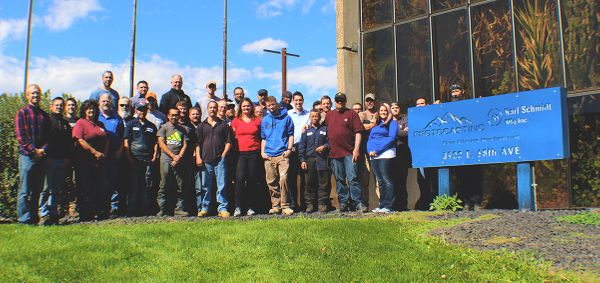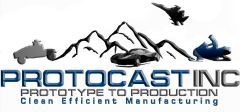PROTOTYPE TO PRODUCTION
History
Protocast Company History:
Protocast was founded in 1995 in a small 2000 sqft shop just north of Denver, Colorado by Mike Kaiser and Kevin Fortin. Protocast Inc., was founded on speed and 3D printing technology. Protocast utilized the dba Prototype Castings as that was the business focus. The tooling process that was used to create molds started with SLA’s, urethane and silicon tooling was created from the 3D pattern. These tools were used to create plaster molds. Metal was then poured into the plaster mold to create the casting. In 1998 Prototype Casting moved to a larger shop in Northglenn CO. Protocast continued to grow and in 2000 moved part of its current location in Denver. Mike Kaiser retired in 2011 and sold the business to longtime employee Chad TeBeest. Currently, Protocast occupies a total of 55,000 sqft. By 2012 the need to go into Production also coincided with a renewed focus on Protocast as the marketed name. As time goes by and the business evolves, Protocast has aimed to stay in tune with its customers and their needs while keeping in alignment with our Vision and Mission Statement.

Added processes as company grew and technologies evolved
CNC Machining was added in 2002 in response to customers request for complete parts verses just castings. Larger capacity CNC machines have replaced the first machine as well as added capacity. Currently, Protocast operates 10 CNC machines, capable of 5-axis operations and the largest bed size of 60” by 120”.
Sand casting was added in 2005 with the addition of a Tinker Omega continuous sand mixer. Sand casting was a great compliment to the RPM (Rubber Plaster Mold), process the company was founded on. Sand casting currently makes up about half of our foundry business.
Also in 2005, Protocast began cutting tools from pattern board on CNC equipment. Thus, replacing the tooling process the company was founded on. With the advancement in speed of CNC machining, and the increased processing power of computers for CAM programming, the choice was easy. The tools that are now produced are created faster, cheaper, and are more accurate than tools made from 3D printed patterns.
Investment Casting was added in 2008. The process is slightly different than the traditional investment process, in so that we never create a tool. All of the castings are produced directly from a 3D printed pattern. This process works well for small, low volume, complex parts. This process is faster, cheaper, and provides an actual industry standard, fully dense casting when compared to DMLS (Direct metal laser sintering)
In 2011, Mike Kaiser the co-founder sold Protocast to Chad TeBeest. Chad, had worked for Protocast for 7 years at the time. Mike loved the business that he founded and enjoyed success with, but wanted to retire and travel the country in his RV.
In November of 2012, just 11 short months after entering full retirement, Mike Kaiser passed away of pancreatic cancer. During his last few months Mike was very happy to see his dream continue to grow. We will always remember Mike and many of his visions and directions, continue to guide Protocast.
In 2013, Protocast added the ability to heat treat castings in house. This increased the speed at which we could provide heat treated parts. The process typically took 2-3 days before, now it can be done in most cases overnight.
In 2014, Protocast purchased a HAAS gantry style CNC mill for cutting tools. This over doubled our tool cutting capacity and allowed us to provide better lead times to our customers. This machine also has a much larger bed (120”x60”) than our other CNC mills, thus increasing the size of tools that we can produce.
In 2015, Protocast greatly expanded the sand casting line with the addition of a larger continuous sand mixer with dual hopper, automated controls, and mechanical reclaim. This allows Protocast to move from just low quantity high quality to production quantities, while still maintaining the high quality demanded by the market place. The investment also represents the commitment of Protocast to minimize its footprint for consuming natural resources, specifically the silica sand used in sand casting. Because of secondary markets for reclaimed sand, and the ability to reuse 80% of the sand in the process, the waste of sand to landfills will be completely eliminated!!!
In Spring of 2017, we moved into our new 50,000 sq ft building!
Feb of 2020, Permanent Mold Casting is added.
